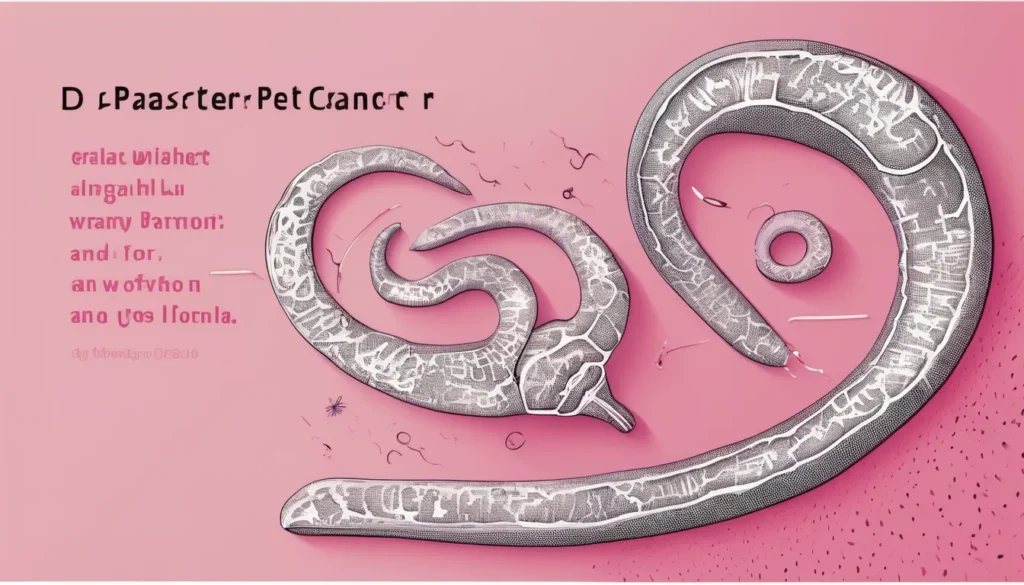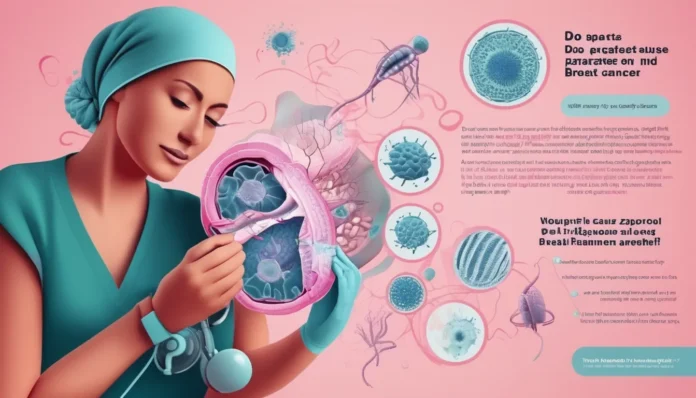Do Parasites Cause Breast Cancer?
There is no direct scientific evidence that parasites cause breast cancer. Breast cancer is primarily linked to genetic, hormonal, and environmental factors, but some parasites, such as Schistosoma and Helicobacter pylori, have been associated with an increased risk of certain cancers due to chronic inflammation. However, these links do not apply specifically to breast cancer, and more research is needed to determine any definitive connection between parasites and breast cancer development. Also Read about How to Treat Breast Cancer with Hyperthermia in Dogs
Understanding Parasites and Their Role in Disease
Parasites are organisms that live in or on a host organism and derive their nutrients at the expense of the host. These can range from protozoans (single-celled organisms) to helminths (worms). Parasites can cause various health issues by evading the host’s immune system, disrupting bodily functions, and triggering chronic infections. The relationship between parasitic infections and cancer has been well-documented, especially with liver, bladder, and bile duct cancers. However, the question of whether parasites can cause breast cancer is still under investigation.
Also, Check Now Can You Get Disability for Breast Cancer?
How Parasites Influence the Immune System
One of the primary ways parasites may influence cancer development is through their ability to modulate the immune system. Some parasites release excretory-secretory products that can suppress or manipulate the immune response. For example, certain helminths can create a pro-tumor environment by altering immune function, potentially leading to the uncontrolled growth of cells, which is characteristic of cancer. This immune modulation might reduce the body’s ability to fight tumor cells, thereby increasing the risk of tumor metastasis in certain conditions.
Parasites such as Toxocara canis have been studied in connection with cancer due to their ability to influence the immune system and promote an environment conducive to tumor growth.
Link Between Chronic Inflammation and Cancer
Chronic infections caused by parasites often lead to prolonged inflammation, which is a known risk factor for cancer. Inflammation can promote tumor initiation, progression, and metastasis. Parasites that cause long-standing infections may, therefore, indirectly increase the likelihood of cancer, including breast cancer, by creating a persistent inflammatory state in the body. Read about Breast Cancer Vaccine: A Promising Future in Cancer Prevention
Mechanisms of Parasite-Induced Tumor Growth
Several mechanisms have been proposed for how parasitic infections may promote tumor growth:
- Immunosuppression: Many parasites have evolved ways to evade the immune system, reducing the body’s natural cancer-fighting mechanisms. This allows abnormal cells to proliferate unchecked.
- Chronic Inflammation: As mentioned earlier, parasites can cause chronic inflammation, which is associated with an increased risk of cancer development. The longer the inflammation persists, the greater the chance that mutations may occur, leading to cancer.
- Angiogenesis: Some parasites can promote the formation of new blood vessels (angiogenesis) around the tumor, providing it with the nutrients needed for growth.
- Modulation of Tumor Microenvironment: Parasitic infections may alter the tumor microenvironment to favor cancer growth. Helminths, in particular, can create a favorable environment for cancer cells to thrive.
Parasitic Infections and Breast Cancer
While there is no direct evidence to conclusively state that parasites cause breast cancer, studies suggest that parasitic infections may influence breast cancer progression in specific contexts. Research on animal models and in vitro studies has shown that certain parasitic antigens can interact with tumor cells, potentially promoting metastasis and tumor invasion. However, more research is needed to fully understand this relationship in human breast cancer cases.
Parasites Known to Promote Cancer
Several parasites are known to increase cancer risk, particularly in other organs. These include:
- Schistosoma haematobium – associated with bladder cancer.
- Opisthorchis viverrini and Clonorchis sinensis – linked to bile duct cancer.
- Toxocara canis – associated with several cancers, including lung cancer and potentially breast cancer.
- Fasciola hepatica – linked to liver damage and potentially cancer.
- Plasmodium falciparum – related to Burkitt’s lymphoma in endemic regions.
Though none of these parasites have been directly linked to breast cancer, their ability to cause chronic infection and modulate the immune system suggests they may contribute to cancer progression indirectly.
Parasite-Induced Immune Modulation and Breast Cancer Progression

Immune modulation is one of the critical factors by which parasites can influence cancer progression. For example, helminths release certain products that can suppress anti-tumor immune responses. This could allow tumor cells in the breast to evade immune detection and continue growing, leading to potential metastasis.
Helminths, for instance, produce excretory-secretory products that can affect the immune system. These substances may suppress the body’s immune surveillance mechanisms, reducing its ability to detect and destroy tumor cells. By creating an immunosuppressive environment, parasites can indirectly promote the growth and spread of cancer cells.
Tumor Microenvironment: A Battlefield for Parasites and Cancer
The tumor microenvironment is a dynamic and complex ecosystem composed of cancer cells, immune cells, blood vessels, and other supportive structures. Parasites can alter this environment in ways that favor cancer growth. By releasing pro-inflammatory cytokines and other immune-modulating molecules, parasites can influence how immune cells respond to cancer. These changes can lead to:
- Increased tumor vascularization (the growth of blood vessels that supply the tumor)
- Enhanced tumor cell survival
- Greater potential for tumor metastasis
Parasite-Induced Metastasis and Breast Cancer
Some studies suggest that parasitic infections may increase the likelihood of metastasis in breast cancer. For instance, in certain animal models, parasitic antigens from Toxocara canis have been shown to promote metastasis by influencing the immune system’s response to tumors. These findings suggest that parasites might not only promote cancer development but also increase the aggressiveness of existing cancers.
While these studies are still in their early stages, they provide crucial insights into how chronic infections might contribute to cancer metastasis, particularly in breast cancer.
Prevention and Mitigation of Parasite-Induced Cancer
Preventing parasitic infections is one of the most effective ways to reduce the risk of parasite-induced cancers. Some key strategies include:
- Regular screening for parasitic infections, especially in regions where such infections are common.
- Proper sanitation and hygiene practices to prevent parasite transmission.
- Antiparasitic medications in cases of known infections.
- Vaccination programs where available, especially for helminths like Schistosoma.
- Public health education on the importance of avoiding contaminated food and water sources, which can harbor parasites.
By mitigating the risk of parasitic infections, individuals can reduce the potential for inflammation and immune system dysfunction, thereby lowering their overall cancer risk.
Future Research Directions
As research into the relationship between parasites and breast cancer progresses, future studies should focus on:
- Identifying specific parasite species that might influence breast cancer progression.
- Investigating the role of the immune system in both parasitic infections and breast cancer.
- Exploring the tumor microenvironment and how parasitic infections might alter it to promote cancer growth.
- Developing new therapeutic strategies that target parasitic infections to prevent cancer metastasis.
Conclusion
While the connection between parasites and breast cancer is not fully established, emerging research suggests that parasitic infections may play a role in cancer progression and metastasis through their influence on the immune system and the tumor microenvironment. Chronic parasitic infections, particularly those caused by helminths like Toxocara canis, can modulate immune responses in ways that may promote cancer development, including breast cancer. Ongoing research will be crucial in uncovering the exact mechanisms behind this relationship and in finding ways to prevent parasite-induced cancers.
FAQS
1. Can chronic parasitic infections increase the risk of breast cancer?
Chronic parasitic infections may increase the risk of breast cancer indirectly by causing prolonged inflammation and immune system dysfunction, which can create a pro-tumor environment.
2. Which parasites are most likely to be linked to cancer development?
Parasites like Schistosoma haematobium, Toxocara canis, and Plasmodium falciparum are associated with cancer, although their direct connection to breast cancer is still under investigation.
3. How do parasites affect the immune system of breast cancer?
Some parasites can suppress the immune system by releasing excretory-secretory products, potentially reducing the body’s ability to fight tumor cells and contributing to breast cancer progression.
4. Is inflammation caused by parasites a significant factor in cancer development?
Yes, chronic inflammation from parasitic infections can promote tumor initiation and progression, especially by altering immune responses and fostering a tumor-friendly environment.
5. What preventive measures can reduce the risk of parasite-related cancers?
Preventing parasitic infections through improved hygiene, sanitation, regular screening, and antiparasitic medications can significantly reduce the risk of parasite-induced cancer, including breast cancer.








